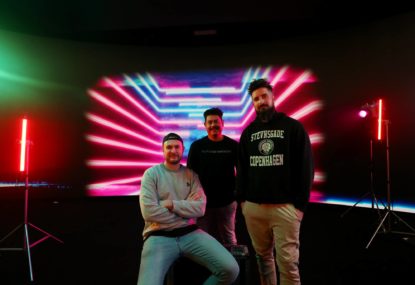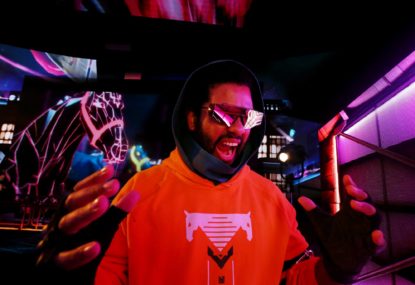The racehorses in Zed Run can’t munch on an apple or leave a steaming mound of manure for a stable hand to sweep up.
If someone gifts you one, forget about looking it in the mouth, but be very thankful – they can be bred, raced and win you a motza online.
Digital NFTs, or non-fungible tokens, hit the bigtime earlier this year when auction house Christie’s sold the digital artwork Everydays: The First 5000 Days, by cryptoartist Beeple, for a mind blowing $US69 million.
It’s the same technology – one that allows creators and collectors to verify authenticity of ownership by encrypting an unforgeable signature on blockchain – which Australian company Virtually Human Studios has been using to power their breakout horse racing game called Zed Run.
Zed Run co-founder Chris Laurent told Bitcoin and Ethereum news site Decrypt the idea for the game came when he was picking up a takeaway order at his local Chinese restaurant back in 2017.
He saw an ad on the wall for a horse stud farm that was offering a stallion for breeding at a fee of $15,000. Laurent, involved in the horse racing industry through work with a bookmaker, was aware of a trading game called CryptoKitties based on the Ethereum blockchain, and he ran with the idea to create the breeding system for Zed Run.
Laurent said that at first he and co-founder Rob Salha couldn’t believe they found buyers for their NFT horses, especially before they launched racing and breeding aspects of the game.
But within weeks horses first bought for $30 were being sold on the secondary markets for as much as $10,000.
The game began with the sale of 4,450 digital horses for $30 each but has proven popular beyond its creators’ dreams. Since then, 11,000 horses have been bought and sold, and another 8,000 bred across 3,600 digital stables. One horse has sold for more than $A150,000.
“When it comes to blockchain adoption, the best way to bring in new users is to give them something that they’re familiar with,” Laurent told Decrypt.
“The reason why Zed is doing well is because you don’t have to explain it: you buy a horse, pay to enter a race, and take home a portion of the pot if you’re successful—that’s literally it.”
Zed Run races take place on a floating track that cuts through a futurist landscape – fans of cult movie Tron will feel right at home – and are decided by algorithms assessing the abilities of the competing horses, which their owners have paid to enter.

Zed Run creators Geoff Wellman, Chris Laurent and Chris Ebeling. (Photo by Getty Images)
Owners pay small entry fees — usually between $2 and $15 — to run their horses against others for prize money.
At the core of Zed Run is the NFT, a unique crypto asset that can be linked to digital content, in this case a digital horse. Owners buy and sell horses, and enter them in races with prizes at stake.
Unlike most NFTs – usually artworks or videos that are kept as collectibles or sold for profit – each digital horse is what Zed Run’s creators call a “breathing NFT.”
“A breathing NFT is one that has its own unique DNA,” head of partnerships at Virtually Human Studio, Roman Tirone, told The New York Times.
“It can breed, has a bloodline, has a life of its own. It races, it has genes it passes on, and it lives on an algorithm so no two horses are the same.”
The game, and level of prizes on offer, has now received a significant boost by forging a partnership with Pony Run, a gaming developer underpinned by PlayChip’s cutting edge PLA ERC20 token.
Pony Run will extend the gaming experience within Zed Run through sponsorship of annual special racing events, each with a pledged token prize pool using PlayChip – a universal gaming token. PlayChip is a major player in the incentivised, blockchain enabled, sports community and gaming ecosystem, and has a vision of uniting the US$3 trillion global gaming market.
The Pony Run sponsored events will inject an estimated $US30 million into Zed Run’s community over a three-year period by committing a minimum of 2.5B PlayChip tokens in prize pools.
Allocation of the PLA tokens will drive unprecedented value directly to stable owners in Zed Run, giving them the chance of winning PlayChips in addition to current Ethereum prize pools.
It is a big moment, too, for the PlayChip community and its holders, who have been waiting for a special project to launch PLA into the community. PLA is available though Bittrex or HitBTC.
“The PlayChip was built with a vision to be a universal gaming token and it is exciting to know it is being adopted by innovation leaders, Pony Run and Zed Run,” said PlayChip spokesperson Jane Morgan.
“NFT digital horse racing, ownership and breeding is such a great concept that will drive years of new business, product innovation and spin offs.“
It is little wonder the Zed Run ecosystem has gained instant attention and is rapidly growing inside and outside the crypto space.
“PlayChip being selected and built into the next phase of development to facilitate and supercharge community growth is powerful news for PlayChip holders.”
Pony Run is backed by influential gaming executives including sports and data
innovator Todd Buckingham, who oversees the world-leading wagering technology company BetMakers.
“I have followed the team behind Zed Run since its inception,” Buckingham said.
“It is great to see the traction they have received. The sports and entertainment space is moving at rapid speed. The NFT space is certainly an area I am keeping a close eye on and it is evident the impact that Zed Run has created is substantial.”
The innovation of ownership is what separates Zed Run from standard online horse racing games – and some of the owners, as in real life, are big time players.
One of those is Alex Taub, a Miami-based entrepreneur who owns around 50, including one for his daughter who likes to race it after school.
“Most NFTs, you buy them and sell them, and that’s how you make money,” Taub told The New York Times. “With Zed, you can earn money on your NFT by racing or breeding.”
“It wouldn’t surprise me if some of these horses are trading for $1 million in a couple months,” said Yair Altmark, a venture capitalist in New York who has spent over $300,000 on digital horses, in The Times.
Another of the game’s cofounders, Geoff Wellman says its strength is in the connection between man and beast.
“It’s about bridging the real with the virtual and developing an NFT you can emotionally connect with,” Wellman said.
“Each racehorse is unique and will behave slightly differently, and each racehorse will take you on a different journey.
“We have stable owners who have traded their racehorse telling us they still keep an eye on how the racehorse is doing because of the connection they have with it.”






























































































